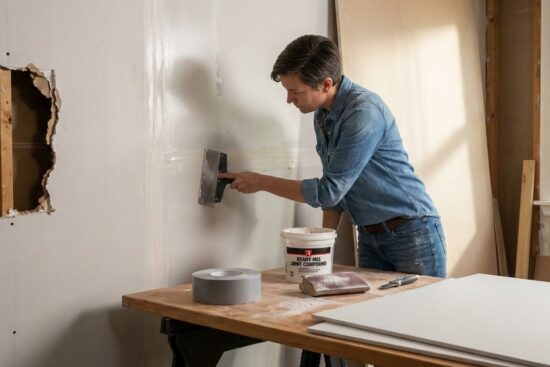
Understanding the role of permits is important during a home improvement project. Whether you are increasing the space by building a new room or making slight repairs, building permits ensure your work meets safety standards and complies with local regulations. This is greatly critical in a state like North Carolina, where codes of construction are strictly enforced.
Permits are not only for major changes. Some minor updates may also need permission to meet local ordinances. Partnering with a licensed contractor can facilitate you in the process and assure that all necessary permits are secured before commencing construction or repair work on your property.
Properly executing the protocols can lead you to spend less time and money and avoid fines or legal issues. It also safeguards your investment and may even increase the overall worth of your home. With a proper understanding of when and why to get a permit, you can keep your project on track and meet all the requirements mentioned.
Key Takeaways
- Permits show that your project meets safety and local building codes.
- Minor upgrades might need prior authorization.
- Licensed contractors help secure necessary permits.
- Following protocols saves time, money, and avoids legal issues.
- Proper permits protect your investment and home value increases.
Summary of Renovation Permits and Rules
It is very important to know the rules about permits before you renovate. These long lost authorizations are what you need to have your project meet the safety and the local codes. For instance, if you are adding a bedroom or replacing an entire electrical system, the permits are the tools that help keep your investment secure and protect your house.
What Are Renovation Permits?
Renovation permits are the official confirmations that you have to obtain for major changes in your property. This involves things like changing the structure, electrical upgrades, and plumbing modifications. For instance, building an addition room or remodeling a kitchen requires a permit. These authorizations are the things that ensure your work with safety and quality standards.
The Role of Building Codes and Local Regulations
Building codes are rules that your city or state set as laws for the construction and repairing. All over North Carolina, these codes are strictly upheld to assure safety and durability. Local regulations vary so you should check with your city’s page or a licensed contractor. Observing these codes can keep your house safe and also preserve its value over the years.
These are some typical projects which might need a permit:
- The addition or removal of walls
- Installing new electrical systems
- Upgrading plumbing
- Getting a deck or patio thrown in
Asking for and getting the permits you need, will not only staves off the legal issues but will also let your project complete according to all required standards. This is a crucial step in home protection and your investment as well.
The Way Through the Permit Application Process
Planning to start a home project? The first thing you need to do is apply for a permit. This is the first step that will enable the project to be done in accordance with the local standards and thus, it will avoid potential setbacks. If you understand the steps involved, you will not waste time and thus your project will run smoothly.
Preparing and Submitting Your Permit Application
It is essential to check whether your project needs a permit or not. It is possible to consult a licensed contractor or find the needed information on your city’s official website. You should have all the necessary documents like blueprints, site plans, and project details. The completion of the preparation requires all documentation at a site which will speed up the process.
Take the time to check your forms two times to avoid errors. A lack of information can result in a postponed approval. Keep the copies of all the documents for your record-keeping. This not only allows you to manage the progress but also makes you ready for inspections.
Working With Licensed Contractors and City Officials
In this process, licensed contractors are very crucial. They confirm that your job is carried out according to the local building codes and statutes. Their education can take you far and save you from expensive errors and speed up the process of approvals.
Be proactive with city officials, the early birds catch the worms. City officials have the ability to furnish you with valuable information. They may even clarify any queries you have concerning the requirements. Follow their rules religiously to be on schedule. Setting appointments for inspections ahead will also keep your project on track.
Here are a few practical steps to facilitate the process:
- Visit government websites to get local information; they are the best resource.
- Clarify anything you don’t understand about your application by asking questions.
- Stay organized by making sure that all your documents are in one place.
- Plan your project effectively bearing in mind the possible delays.
With these practical actions you can readily navigate through the permit application process. Making proper preparations in the first place is the key to having your project up to the required standard and it will also boost the home value.
Renovation Permits: Key Tips for a Successful House Project
When it comes to home projects, apart from planning, one must also think of compliance and safety. All permits come in handy as they ensure that your work is done properly and the local standards as well as your financial investment are guarded. Here are the tricks to walk through the process fast and without the common mistakes.
Following the Rules and Safety Precautions
Every single project must comply with the local building codes and these are the must-follow rules. These rules are major drivers of safety and durability. For instance, in North Carolina, the codes are diligently observed. Always consult your city or hired licensed contractor about the requirements that need to be met.
Stay in compliance by:
- Reviewing the local guidelines strongly before embarking on your work.
- Documenting all of the work that meets safety standards.
- Timing important project phases for inspections.
Steering Clear of Permit Errors
A big number of homeowners experience project delays due to incomplete applications or unauthorized modifications. As a result, a deck built without a permit could lead to fines or expensive repairs. Remember that it is worth your time to do the paperwork well and it is better to avoid employing those working without a license.
The more common mistakes are:
- Forgetting the deadline for inspections.
- Making changes without getting permission.
- Failing to check the licenses of the contractors.
Budget and Manage the Permit Costs
Permit fees are not the same for different projects and places. It is true that costs can rise, but they are a small price to pay to assure compliance and protect your house value. Being prepared will help you avoid unplanned costs.
This is how you can manage your costs:
- Find out the fees on your city’s official website.
- Add permit fees to your project’s overall cost.
- Consider possible delays in your calculation so as to save both time and money.
Utilizing these tactics will make sure your endeavor is going on smoothly and will add value to your home for a long time.
Summary of Key Points
It is very important to that your home project fit in with the local regulations first of all. The pre-requisites are not just keeping your property out of trouble, but also a means of increasing its value in the long run. In case you bring in a licensed contractor you’ll find it sometimes easy, with the work being fully compliant with building codes and the law.
City offices and websites are the primary source for mining your requirements. In cities like North Carolina, you should strictly follow state and local guidelines in order to achieve a trouble-free construction journey. Thus doing them at the outset will not only save time but also will prevent your investment from being wasted through delays.
As daunting as it sounds initially, in the end the gains far outweigh the pains. Rely on knowledgeable people for more information. They are the ones who will ensure that your next project is compliant and also successful.


